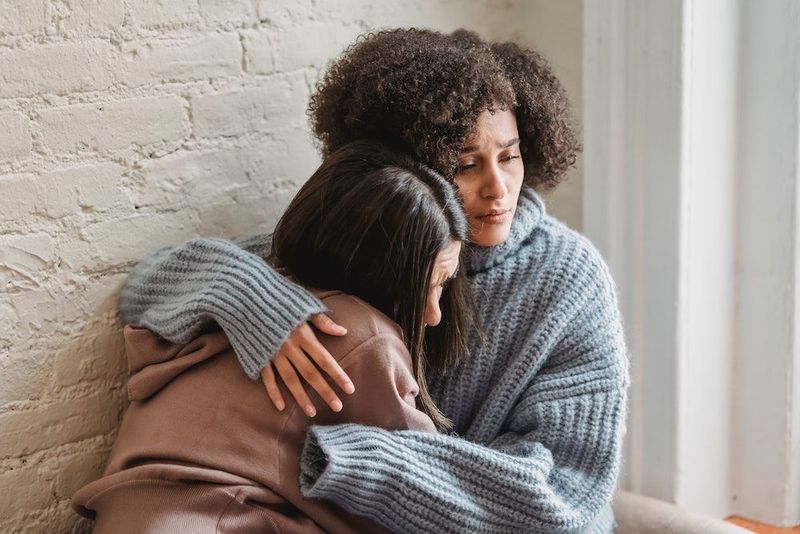I Tried Everything To Fix My Marriage—But Narcissism Was The Wall I Couldn’t Climb
Navigating the complexities of marriage is never easy, but it’s especially challenging when one partner’s narcissism goes unrecognized. This blog post delves into 17 distinct efforts I made to salvage my marriage, each one reflective of my hope and determination.
It took a personal journey to finally understand that narcissism was at the heart of our issues. These stories are raw and honest, each recounting a unique approach I tried in my desperate attempt to fix what seemed broken.
From changing myself to seeking advice from all quarters, these endeavors taught me invaluable lessons about love, compromise, and self-worth. This is not a tale of defeat but one of realization and growth.
1. The Exhausting Things I Did Before I Understood the Real Issue

In the beginning, it felt like an endless marathon, trying every technique and strategy to make things work. I read books, attended workshops, and attempted to embody a more understanding spouse. I believed that if I changed, things would improve. My efforts were sincere, but they took a toll. I was exhausted, both mentally and physically, from the continuous cycle of trying and failing.
Each new attempt came with the hope it would be the one that solved our problems, only to fall short time and time again. It was like chasing a mirage, never quite reaching the oasis of a happy marriage. Yet, I persevered, hoping my efforts would yield the love and connection I yearned for.
It was a lonely journey, filled with self-doubt and questions. Was I the problem? Could I do more? I didn’t realize then that the real issue wasn’t my lack of effort, but something deeper.
2. I kept trying to be “easier” to love

I believed the key to happiness lay in being more lovable. I molded myself into what I thought he wanted, suppressing my own desires. This constant reshaping felt like walking on eggshells, always careful not to crack the foundation I was desperately trying to reinforce.
The more I tried to become this ideal version, the more I lost sight of who I truly was. It was exhausting to maintain a facade, hoping it would be enough to keep the peace and foster a loving relationship. In hindsight, I realize that being “easier” to love meant sacrificing my own identity.
The irony? No matter how much I changed, the underlying dissatisfaction remained. I learned the hard way that becoming someone I wasn’t could never fix what was fundamentally flawed. Love isn’t about being easy; it’s about being real and true to oneself.
3. I read every relationship book I could find

In a desperate bid to find answers, I turned to every relationship book I could get my hands on. My nights were spent poring over pages filled with advice, theories, and success stories. Each book offered a glimmer of hope, a new strategy to implement.
The advice was practical, but it never quite fit our unique situation. I was trying to apply generic solutions to a problem that was anything but ordinary. Yet, I clung to the possibility that knowledge would empower me to change our dynamic.
Reflecting on this period, I realize that while those books offered insights, they couldn’t address the core issue: his narcissism. I was looking for solutions outside when the real answers lay within, in understanding the psychological complexities that were at play.
4. I started taking all the blame just to avoid fights

Avoiding conflict became my mantra, and I found myself taking the blame for anything and everything. If it meant peace, I was willing to shoulder the burden. Each apology note felt like a silent plea for harmony, yet it never came.
This habit of self-blame eroded my self-esteem, leaving me feeling smaller with each passing day. I thought that by taking responsibility, I could somehow control the chaos and keep our relationship afloat.
But peace built on false foundations is fragile. It took time to understand that blaming myself was not only unfair but ineffective. True resolution requires both parties to engage, not just one absorbing the blows. Realizing this was a crucial step in my journey towards self-respect and healthier boundaries.
5. I tiptoed around anything that upset him

Living in constant anticipation of his reactions, I became adept at avoiding triggers. My days were spent gauging his mood, adjusting my actions to sidestep any potential conflict. It was a delicate dance, one that required precision and endless patience.
This environment cultivated anxiety, as I was always on high alert. I thought by being cautious, I could maintain harmony. In doing so, I silenced my own voice, prioritizing his comfort over my own needs.
Looking back, I see how this behavior only enabled the imbalance in our relationship. My silence was interpreted as acceptance, reinforcing the cycle. True love allows for honest dialogue, where both partners feel heard and valued, something I sadly lacked at the time.
6. I went to therapy—alone

Desperate for change, I sought therapy hoping it would equip me with the tools needed to mend our relationship. Yet, I went alone, carrying the weight of responsibility on my shoulders. Each session was a blend of hope and heartache.
Therapy became a space where I could explore my feelings, gain insights into my actions, and reflect on my choices. It was liberating to have a safe environment to express myself without judgment. However, the absence of his participation meant that the root issues remained unaddressed.
While therapy helped me grow, it couldn’t fix what needed both our efforts. It taught me the importance of mutual engagement in resolving conflicts, a lesson I wish I’d understood sooner. Healing is a shared journey, not one to be traveled in solitude.
7. I changed my personality to match his moods

Every day felt like an emotional chameleon act, adapting to his ever-shifting moods. I became a mirror, reflecting back what I thought he wanted to see. This constant transformation was both exhausting and bewildering.
In my quest for harmony, I lost touch with my authentic self, becoming someone defined by another’s whims. It was a survival tactic, one I hoped would create a more harmonious relationship but instead left me feeling hollow.
Through this experience, I learned that true connection isn’t about adaptation but about authenticity. It took time, but I eventually understood that a healthy relationship should encourage individuality, not suppress it. Today, I strive to be true to myself, embracing my unique identity without fear.
8. I begged him to open up

Communication felt like a one-way street, with my words hitting an emotional brick wall. I longed for him to open up, to share his inner world with me. Countless conversations ended in frustration as my pleas for vulnerability went unheeded.
Despite my efforts, intimacy remained elusive, locked behind a door I couldn’t unlock. The more I asked, the more distant he became, leaving me to grapple with feelings of rejection and inadequacy.
Reflecting on this, I realize that true communication requires willingness from both sides. No amount of begging can create openness where there is resistance. I’ve since learned the importance of setting boundaries and recognizing when to step back, allowing room for genuine connection to flourish naturally.
9. I excused everything as “just how he is”

Defensiveness became my shield as I rationalized his behavior, attributing it to his personality. Each incident was dismissed with a casual shrug, accepting it as a part of who he was. This mantra became my coping mechanism, a way to avoid deeper scrutiny.
By making excuses, I minimized the impact of his actions on my well-being. I convinced myself that understanding him meant accepting him unconditionally, even when it hurt. In doing so, I ignored my own needs and desires.
Over time, I learned that while acceptance is important, it should not come at the expense of self-respect. Recognizing the difference between acceptance and enabling was crucial in my journey towards healthier relationships, ones built on mutual respect and understanding.
10. I let go of my needs to meet his

Compromise is integral to any relationship, but I took it to an extreme. I systematically erased my own needs, prioritizing his happiness above all else. Each crossed-out need was a testament to my self-sacrifice, yet it only deepened the chasm between us.
My actions were fueled by the hope that by fulfilling his needs, mine would eventually be met as well. This belief was misguided, as it led to resentment and unmet expectations.
Through this, I discovered the importance of reciprocal care, where both partners feel nourished and valued. It’s not selfish to voice one’s needs; it’s essential for a balanced relationship. Learning to prioritize myself was a pivotal step in reclaiming my sense of worth and agency.
11. I minimized my pain to avoid being called dramatic

I mastered the art of masking my emotions, downplaying my pain to keep the peace. Each forced smile was a façade, concealing the turmoil within. I feared being labeled dramatic, so I convinced myself that my feelings weren’t valid.
This minimization took a toll, leaving me isolated in my suffering. I thought that by ignoring my pain, I could somehow maintain stability, but it only deepened the rift between us.
In hindsight, I see that acknowledging and expressing one’s emotions is not a weakness but a strength. Embracing my feelings was a significant part of my healing process, allowing me to connect with others in a more authentic way. It’s okay to feel deeply and to let those emotions be seen.
12. I believed it was just a rough patch—for years

Hope can be a double-edged sword, and mine kept me tethered to a relationship that was fraught with challenges. I clung to the belief that we were simply in a rough patch, one that would eventually pass, bringing us closer together.
Year after year, I remained optimistic, dismissing red flags as temporary setbacks. This perpetual waiting game eroded my spirit, as each year bled into the next with little change.
Coming to terms with the reality of our situation was difficult but necessary. It took courage to confront the truth that some rough patches are not meant to be endured indefinitely. I learned that growth sometimes means letting go, making room for new beginnings and opportunities for genuine happiness.
13. I stopped confiding in friends

Friendship offers solace, but I withdrew, fearing judgment or advice I wasn’t ready to hear. I isolated myself, believing I could manage our issues alone, yet this self-imposed silence only added to my burden.
Without the support of friends, my perspective narrowed, making it harder to see the situation clearly. I missed the empathy and understanding that comes from sharing one’s struggles with trusted confidants.
Reconnecting with friends eventually provided the clarity I needed. Their insights and support helped me navigate my emotions and recognize patterns I had overlooked. It reminded me of the importance of community and the strength that comes from shared experiences, something I had denied myself for too long.
14. I thought if I loved harder, he’d soften

Love was my chosen tool, wielded in hopes of melting the barrier between us. I poured my heart into every interaction, believing that my affection could bridge the gap and bring us closer.
Despite my efforts, his demeanor remained unchanged, leaving me to question my worth. Loving harder didn’t yield the softness I hoped for; instead, it magnified the emotional divide.
Through this, I realized that love cannot flourish when it’s one-sided. It’s a collaborative effort that requires vulnerability and reciprocity from both partners. This understanding was painful but pivotal, guiding me towards healthier, more balanced relationships where love is a shared journey, not a solo endeavor.
15. I stayed quiet even when everything in me wanted to scream

Silence became my refuge, a way to maintain calm amidst the chaos. I swallowed my words, choosing quiet compliance over confrontation. Each unspoken scream echoed within, a reminder of the storm I kept at bay.
In my quest for peace, I lost my voice, unable to express the depth of my frustration and hurt. This silence became a prison, trapping my true self and stifling my potential for growth.
Over time, I learned the power of speaking up, embracing the strength that comes from voicing one’s truth. It was a liberating realization, one that allowed me to reclaim my narrative and move forward with confidence and clarity. True peace comes from authenticity, not silence.
16. I kept holding onto “potential”

Potential became my anchor, the vision of what could be if only we weathered the storm. I clung to the idea that beneath the surface lay a harmonious future waiting to be realized.
This hope blinded me to the present reality, as I invested time and energy chasing a dream that remained elusive. The potential was enticing, yet it wasn’t enough to sustain a fulfilling relationship.
Through this, I learned that potential is not a promise. Building a future requires action in the present, with both partners committed to growth and change. Recognizing this truth was freeing, allowing me to focus on relationships grounded in reality, where dreams are actively pursued, not passively awaited.
17. I tried to be his therapist instead of his wife

In my efforts to understand him, I assumed the role of therapist, listening intently and offering advice. I believed that if I could help him work through his issues, our relationship would flourish.
This dynamic blurred the lines between partner and counselor, leaving me emotionally drained. My attempts to fix him overshadowed the need for mutual support, creating an imbalance that was unsustainable.
Eventually, I recognized that this approach denied both of us the opportunity for genuine connection. A healthy relationship requires equality, where each person is responsible for their own growth and well-being. It was a hard lesson, but one that ultimately led to a more balanced perspective on love and partnership.
18. I convinced myself I was the one who needed fixing

Self-doubt became my constant companion as I internalized the belief that I was the one who needed to change. I scrutinized every flaw, convinced that altering myself could heal the rift between us.
This relentless self-examination was exhausting, leaving me feeling inadequate and unworthy. I failed to see that a partnership thrives on mutual acceptance, not one-sided transformation.
In time, I learned the importance of self-compassion and the value of embracing my imperfections. It was a journey towards self-acceptance, recognizing that I am enough as I am. This realization was empowering, guiding me towards relationships where love is based on authenticity and mutual respect, not the illusion of perfection.







